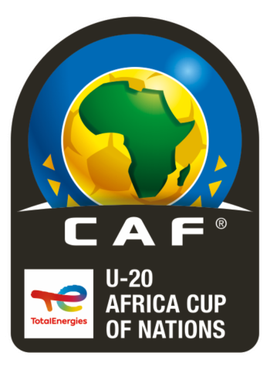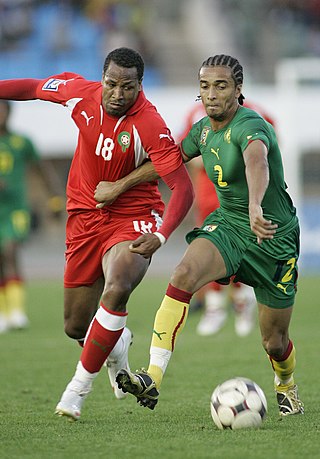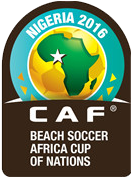
The Confederation of African Football, or CAF for short, is the administrative and controlling body for association football, futsal and beach soccer in Africa. It was established on 8 February 1957 at the Grand Hotel in Khartoum, Sudan by the national football associations of Egypt, Ethiopia, South Africa and Sudan, following formal discussions between the aforementioned associations at the FIFA Congress held on 7 June 1956 at Avenida Hotel in Lisbon, Portugal.

The Nigeria national football team represents Nigeria in men's international football. Governed by the Nigeria Football Federation (NFF), they are three-time Africa Cup of Nations winners, with their most recent title in 2013. In April 1994, the Nigerian national football team was ranked 5th in the FIFA rankings, the highest FIFA ranking position ever achieved by an African football team. Throughout history, the team has qualified for six of the last eight FIFA World Cups, missing only the 2006 and 2022 editions. They have reached the round of 16 on three occasions. Their first World Cup appearance was the 1994 edition. The team is a member of FIFA and Confederation of African Football (CAF).

The 2013 Africa Cup of Nations, also known as the Orange Africa Cup of Nations South Africa 2013 for sponsorship reasons, held from 19 January to 10 February 2013, was the 29th Africa Cup of Nations, the football championship of Africa organized by the Confederation of African Football (CAF). Starting from this edition, the tournament was switched to being held in odd-numbered years instead of even-numbered years so that it does not clash with the FIFA World Cup. This edition was therefore the first to be held in an odd numbered year since 1965.

Issa Hayatou is a Cameroonian sports executive, former athlete and football administrator best known for serving as the president of the Confederation of African Football (CAF) between 1988 and 2017. He served as the acting FIFA president until 26 February 2016 as previous president Sepp Blatter was banned from all football-related activities in 2015 as a part of the that year's FIFA corruption investigation. In 2002, he ran for president of FIFA but was defeated by Blatter. He is also a member of the International Olympic Committee (IOC).

The Africa Beach Soccer Cup of Nations (BSAFCON) is the main championship for beach soccer in Africa, contested between senior men's national teams who are members of the Confederation of African Football (CAF). It is the sport's version of the better known Africa Cup of Nations in association football.
The 2009 CAF Beach Soccer Championship was a qualifying tournament held during 1 July – 5 July, 2009 in Durban, South Africa that determined which two participants will represent the CAF region at the 2009 FIFA Beach Soccer World Cup.
The 2007 CAF Beach Soccer championship also known as the 2007 FIFA Beach Soccer World Cup qualifiers for (CAF) was the second beach soccer championship for Africa, held in July 2007, in Durban, South Africa. Nigeria won the championship, with Senegal finishing second. The two moved on to play in the 2007 FIFA Beach Soccer World Cup in Rio de Janeiro, Brazil from November 2 - November 11.
The 2008 CAF Beach Soccer Championship also known as the 2008 FIFA Beach Soccer World Cup qualifiers for (CAF) was the third beach soccer championship for Africa, held in March 2008, in Durban, South Africa. Senegal won the championship, with Cameroon finishing second. The two teams moved on to play in the 2008 FIFA Beach Soccer World Cup in Marseille, France, from July 17- July 28.

The Morocco national beach soccer team represents Morocco in international beach soccer competitions and is controlled by the Royal Moroccan Football Federation, the governing body for football in Morocco.
The DR Congo women's national football team represents the Democratic Republic of the Congo in international women's football. It is governed by the Congolese Association Football Federation. FIFA refers to DR Congo as Congo DR.

The U-20 Africa Cup of Nations officially known as TotalEnergies U-20 Africa Cup of Nations for sponsorship reason is the main international youth football competition for CAF nations, and is competed for by under 20 year olds. It is held every two years with the top 4 teams qualifying for the FIFA U-20 World Cup.

The 2017 FIFA Beach Soccer World Cup was the ninth edition of the FIFA Beach Soccer World Cup, the premier international beach soccer championship contested by the men's national teams of the member associations of FIFA. Overall, this was the 19th edition of a world cup in beach soccer since the establishment of the Beach Soccer World Championships which ran from 1995 to 2004 but was not governed by FIFA. This was the fourth tournament to take place under the biennial basis; the World Cup now takes place once every two years, after taking place on a yearly basis until 2009.

The 2015 CAF Beach Soccer Championship, also known as the 2015 Africa Beach Soccer Cup of Nations, was a beach soccer tournament which took place in Roche Caiman, Seychelles on 14–19 April 2015. This was the first time that the CAF Beach Soccer Championship was held in Seychelles. All matches were played at the Roche Caiman Sports Complex.

Football is the most popular sport in Africa. Indeed, football is probably the most popular sport in every African country, although rugby and cricket are also very popular in South Africa.

The 2016 Africa Beach Soccer Cup of Nations, also known as the 2016 CAF Beach Soccer Championship, was a beach soccer tournament which took place in Lagos, Nigeria in December, to determine the best beach soccer nation in Africa and doubles as a qualification event for the 2017 FIFA Beach Soccer World Cup, with the two finalists progressing to the finals in the Bahamas. This was the first time that the tournament is held in Nigeria.
The following were the scheduled events of association football for the year 2018 throughout the world.
The following were the events of association football for the year 2019 throughout the world.

The 2018 Africa Beach Soccer Cup of Nations was the third edition of the Africa Beach Soccer Cup of Nations (BSAFCON), the premier beach soccer championship in Africa contested by men's national teams who are members of the Confederation of African Football (CAF). Originally organised by Beach Soccer Worldwide (BSWW) under the title FIFA Beach Soccer World Cup CAF qualifier, in 2015, CAF became organisers and began using the BSAFCON title to which the competition was officially renamed the next year. Overall, this was the 9th edition of the event.

The 2021 Africa Beach Soccer Cup of Nations was the fourth edition of the Africa Beach Soccer Cup of Nations (BSAFCON), the premier beach soccer championship in Africa contested by men's national teams who are members of the Confederation of African Football (CAF). Originally organised by Beach Soccer Worldwide (BSWW) under the title FIFA Beach Soccer World Cup CAF qualifier, in 2015, CAF became organisers and began using the BSAFCON title to which the competition was officially renamed the next year. Overall, this was the 10th edition of the event.
The 2022 Africa Beach Soccer Cup of Nations was the fifth edition of the Africa Beach Soccer Cup of Nations (BSAFCON), the premier beach soccer championship in Africa contested by men's national teams who are members of the Confederation of African Football (CAF). The championship was originally organised by Beach Soccer Worldwide (BSWW) under the title of FIFA Beach Soccer World Cup CAF qualifier. In 2015, CAF became its organisers and began using the BSAFCON title to which the competition was officially renamed the next year. Therefore, this was the 11th edition of the event overall.












